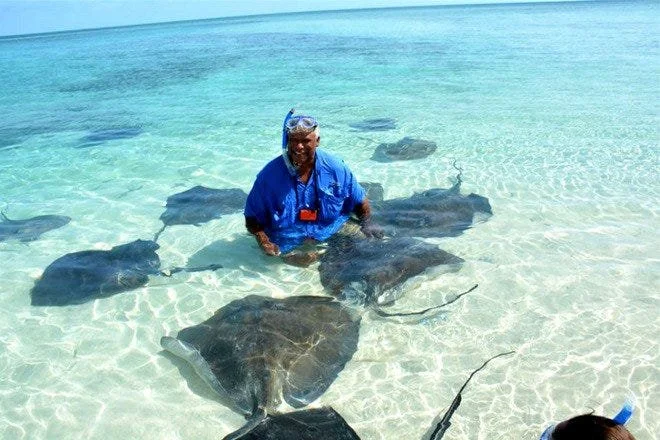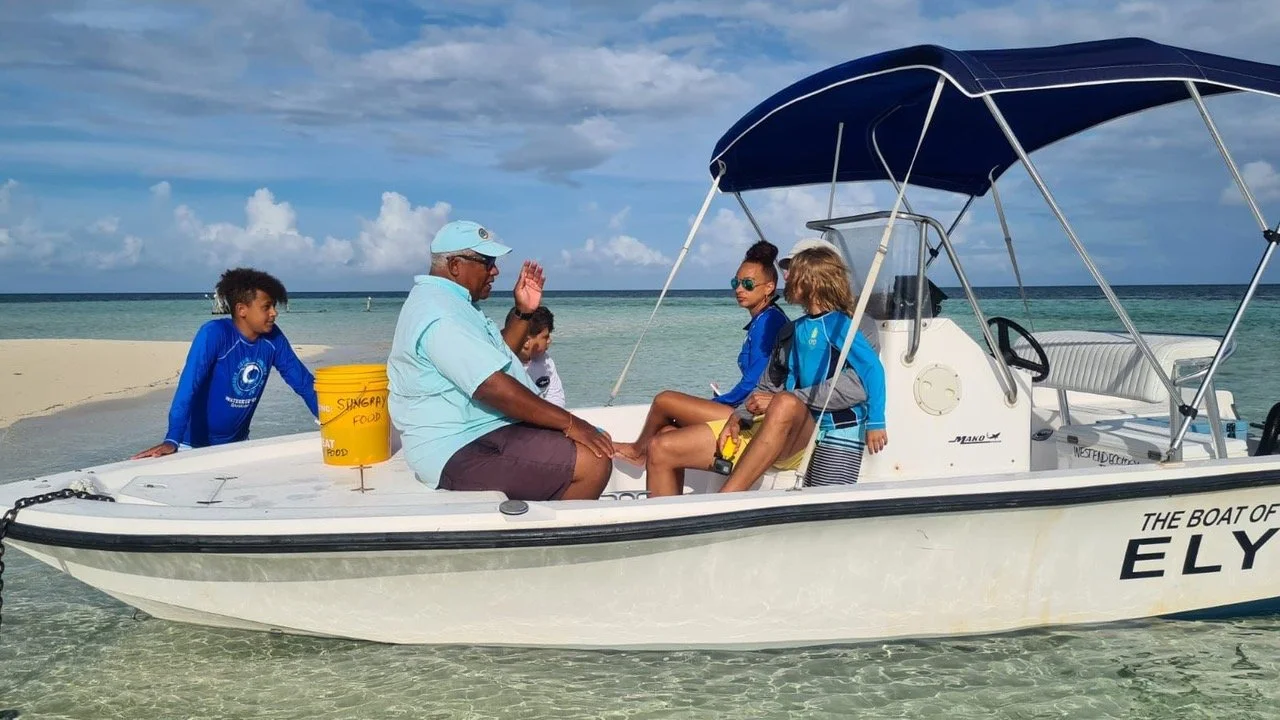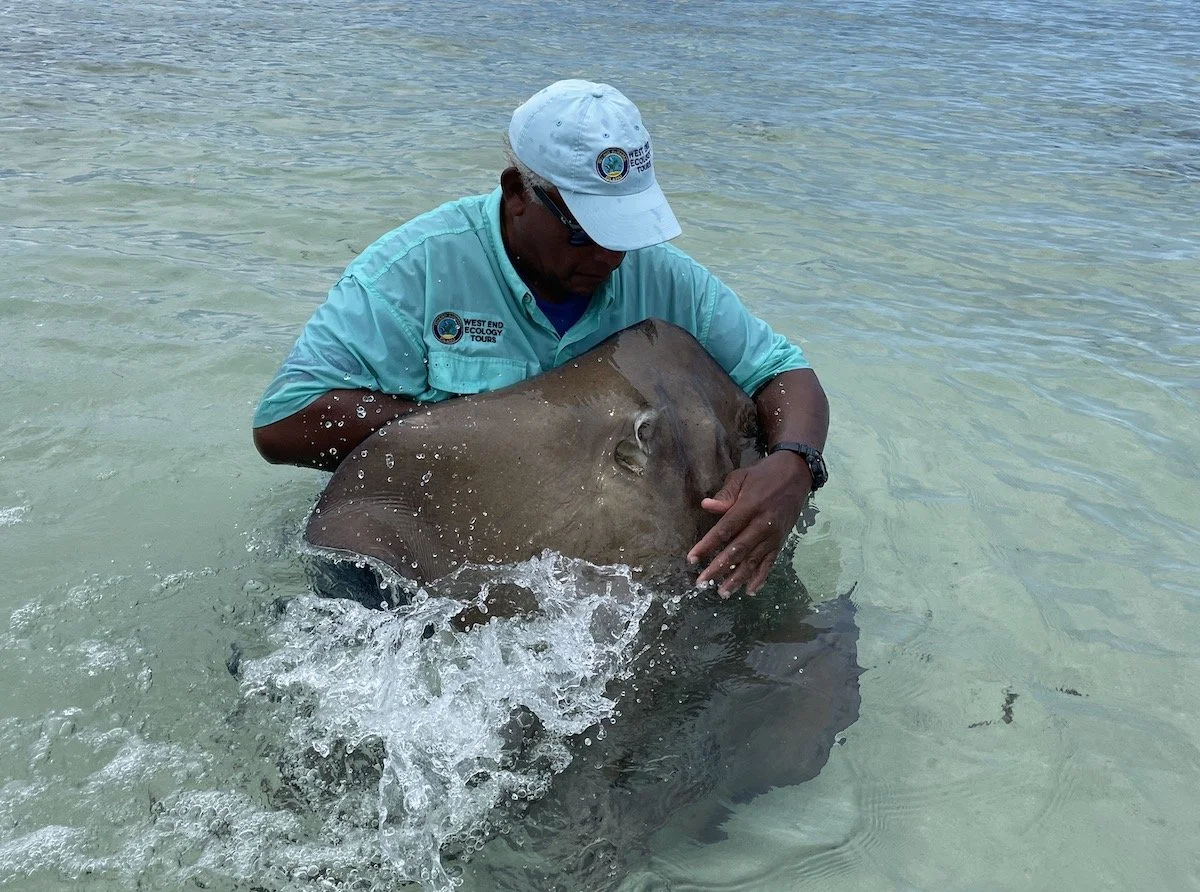American Party Boaters “Terrifying” Rays and Sharks in Bahamian Waters
Species Unite founder Elizabeth Novogratz recently joined the Bahamas’ ‘stingray whisperer,’ Keith Cooper, to witness the destruction being caused by these illegal boaters.
Credit: West End Ecology Tours
With an unnerving name and sharp, venous spines, stingrays have gained a bad rap over the years despite their unaggresive nature and tendency to swim away when they feel threatened. But Keith Cooper, who founded the Bahamian-based educational concept, West End Ecology Tours, is working to change perspectives. Over the last decade, Cooper has formed a bond with some of the stingrays of the Bahamian waters, earning him the name of the ‘Stingray Whisperer’ throughout the island.
Cooper’s ecology boat tours help visitors to see these misunderstood sea creatures in their natural environment while sharing the Bahamas’ incredible eco-system to encourage conservation efforts. During the "Stingray Experience Tour" a maximum of six guests are taken to a deserted, shallow cay off the West End where they can snorkel alongside the ‘angels’ of the sea. With ethics and education at the core of their mission, Cooper and his team work diligently to make sure the animals are never exploited during their visits and take extra precautions to protect the animals.
Credit: West End Ecology Tours
But others don’t have the same mindset. In recent years, boaters have been entering Bahamian waters and illegally fishing for rays and sharks in the shallow waters. A recent hostile interaction with one of these boats saw a huge 40-foot vessel loaded with around ten people arrive at the spot where Cooper conducts his tours. Cooper asked if the captain would move the boat further out so that they would not disturb the stingrays and lemon sharks that meander in the habitat zone, but he was ignored. “You don’t own the cay and do not own the sea,” the captain told him. The people on board then disembarked and headed to the beach about 50 feet away with squid to feed the stingrays and go fishing for sharks.
“I observed these folks behaving recklessly, often poking the rays for fun. Should they accidentally injure a stingray this may cause harm or death to themselves,” says Cooper.
This is a typical example of events that occur frequently during the summer months when boaters - typically from Florida - visit the cay for wild parties, blaring their stereos that reverberate into the sea and frighten the stingrays and lemon sharks, according to Cooper.
Credit: West End Ecology Tours
Species Unite founder Elizabeth Novogrartz recently joined Cooper on his boat to witness the issues firsthand: “I swam with some stingrays and three lemon sharks. All three sharks had huge hooks in their mouths as did a few of the stingrays. It was devastating to see,” she says. “The hooks cause pain, infection and some can’t eat because of them. The boaters mostly come to the Grand Bahama from Florida. They hook these animals for fun. It’s cruel and causes pain and even death. It’s illegal but doesn’t get enforced.”
“Americans are destroying this place and these animals,” adds Novogratz.
What we need, says Cooper is “legislation with stronger penalties to discourage any foreign boater from entering our waters harassing marine life.” But despite reporting the issue to officials, including the Royal Bahamas Police and the Marine Division and Bahamas Customs and Immigration, his concerns are yet to result in action.
“We need a meaningful international awareness campaign,” adds Cooper.
Alongside tours, Cooper has featured in multiple documentaries, as part of his efforts to raise awareness of the vilified stingray, while helping to change mindsets in his own community.
“Educating our people, I’m talking (about) the native Bahamians, about stingrays not being something that they should fear,” Cooper told The Nassau Guardian. “Bahamians were taught from a very young age and for more than three to four generations that stingrays are these dangerous animals to be feared, you can’t get near ‘em, if they do they might kill you.
“What I try to get people to understand is that in order to really appreciate your country, our country, in order to appreciate the marine life while we need to stand up and breathe above the water, we should also put on our masks and a snorkel and learn to breathe under the water or even wear scuba gear.”
And a recent study makes it loud and clear just how little we still know about these gentle underwater creatures. Until recently, scientists thought that stingrays are mostly silent. But videos revealed that two species of stingray - the mangrove whipray and cowtail stingray - can produce striking, unmistakable clicks.
Keith Cooper joined Elizabeth Novogratz on the Species Unite podcast to tell his personal stories about rays and the ecosystem of the Bahamas and to help shine a light on the devastating damage being caused by the party boaters. Stay tuned for the episode coming soon by joining 60,000 others who receive breaking animal news and fresh podcast episodes in their inbox every week.
We Have A Favor To Ask…
Species Unite amplifies well-researched solutions to some of the most abusive animal industries operating today.
At this crucial moment, with worldwide momentum for change building, it’s vital we share these animal-free solutions with the world - and we need your help.
We’re a nonprofit, and so to keep sharing these solutions, we’re relying on you - with your support, we can continue our essential work in growing a powerful community of animal advocates this year.
More stories:
Species Unite
A collection of stories of those who fight the good fight on behalf of animals.







Evaluating drugs with cutting-edge technology instead of animal testing will improve drug safety and cut development times, the agency said as it reveals a roadmap to increase non-animal research techniques.